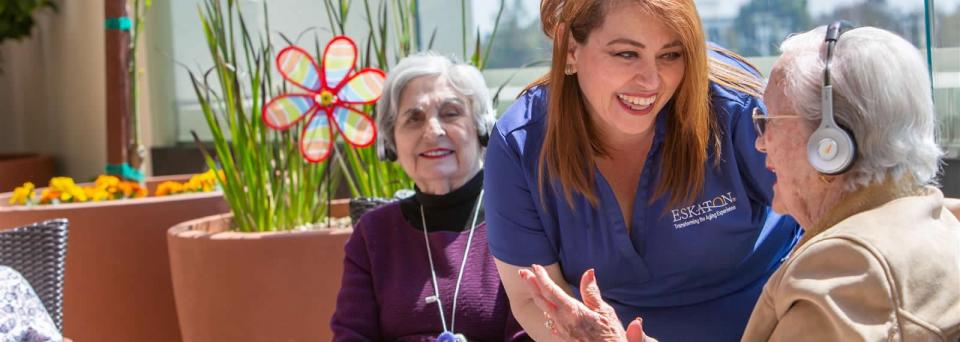
Providing support and resources to individuals and families
living with Alzheimer’s or dementia in the Burlingame area.
What is dementia?
Most people have heard the term dementia but don’t have a
personal experience with it. Often the term is interchanged with
Alzheimer’s disease. However, Alzheimer’s disease is just one
type of dementia that accounts for 60 to 80 percent of cases.
There are many types of dementia ranging from Parkinson’s disease
to vascular dementia to Dementia with Lewy Bodies (DLB). The term
dementia is used to describe a wide range of symptoms associated
with cognitive change including memory loss, impaired judgment,
difficulty speaking and mood changes such as depression. Dementia
may cause a person’s ability to perform day-to-day activities to
become challenging over time. But there is hope that the
challenges can be lessened by creating the right supportive and
adaptive environment.
What can I do following a diagnosis of dementia?
It’s life changing to receive a diagnosis of dementia or
Alzheimer’s disease. It’s normal to feel a range of emotions.
This experience will help you and your loved ones move forward to
discover new ways to live a positive and fulfilling life. There
are support groups and professionals to help cope with the
diagnosis. Here are some tips to think about as you begin your
new journey:
- Keep a list of questions for your doctor. See your healthcare
professional regularly for checkups and ask lots of questions.
- Sleep 7+ hours a night. It’s normal to feel anxious and
worried, but try to get plenty of sleep to help regulate
serotonin and other brain-nurturing chemicals.
- Keep doing what you love. If you love playing music, games,
sports, cooking, gardening and other activities, don’t stop. As
time passes, you may need to make modifications to your
lifestyle, but continue to do the things you love as long as you
find joy in them.
- Stay connected. Surround yourself with family and friends and
talk with them about your changing needs. Engage in your
community, and join new social groups to foster friendships.
- Share your feelings. It’s okay to be open with your emotions.
Anger and sadness at times may feel overwhelming, but don’t
forget to appreciate the many emotions you will experience on
this journey. Experiencing love, happiness and empathy continue
to be possible. Don’t shut out the people in your life; let them
know how you feel. You may be surprised by how supportive friends
and family can be.
- Create an adaptive environment. Write down your schedule,
make to-do lists, stick to your routine, use familiar routes and
keep important phone numbers close by. Remembering every
appointment and every medication is hard for anyone. Use lists
and reminders to help take stress off your shoulders.
What is an adaptive environment?
An adaptive environment is one that takes into consideration the
changes a person is experiencing. For example, changes in vision
and depth perception can be dangerous. Remove area rugs and
flooring with patterns to help better maneuver surroundings.
Other home modifications can include stove sensors that
automatically turn off burners and ovens in the case of
inadvertently leaving them on.
Adapting an environment to specific needs can help promote
independence. Using technologies to set reminders and manage
medication can help people feel in control of their lives.
Technologies such as GPS trackers can also provide comfort to
those who are concerned about their loved one wandering and
getting lost.
One of the most important things to think about in the design of
an adaptive environment is simplification. Simplifying the
process of daily activities, such as keeping a toothbrush within
reach of the sink or making sure a phone charger is in an
easy-to-reach location. The easier it is to complete tasks with
minimal assistance the less likely a person will feel agitated.
There are many products coming out each day that are designed
with this in mind. Click here to see some innovative technologies
that can help simplify your home and improve independence.
What is dementia care?
As a person progresses along their journey, help may be required.
Many family members want to take care of their loved one at home.
Providing emotional and physical support to a person living with
dementia can be exhausting for family caregivers. Burnout is very
real and can be threatening to one’s health. Know your options
and whom you can trust for help. The Alzheimer’s Association is a
great resource and offers 24 hour support 365 days a year. Call
800-272-3900 or visit www.alz.org.
Make sure to do research in your local area. At some point you
may need additional day support, evening support and even
long-term care. Adult day centers are a great place for loved
ones to attend Monday through Friday, especially for family care
providers who are still working, or those who just need to get
tasks done during business hours. Home support by professional
caregivers will also provide much needed relief. Take advantage
when you can.
Know your long-term care options. Skilled nursing homes and
assisted living communities with specialized programs to support
those living with dementia are both options for those needing
24-hour care in a safe and supportive setting.
Who can I turn to?
At The Trousdale we offer memory care apartments with a staff of
professional care partners who will help you or your loved one
live well with cognitive change.
We recognize that the needs of the person living with dementia
change over time. That’s why our care partners and staff receive
additional training to learn how to adapt to these ever-changing
needs. You can expect life at The Trousdale to be filled with
opportunities to grow, discover and experience joy.
We know that cognitive change caused by dementia-related
conditions and Alzheimer’s disease can be challenging. The good
news is that you are not alone. We believe in partnering with you
and your loved ones to foster this new stage of life and embrace
the opportunities ahead.
Contact Us
